May 23, 2025 – Day 96 of 100-Day Dharma Talk, Friday Dharma Q&A, JTS Temporary Board Meeting
Hello. This is the 96th day of Venerable Pomnyun Sunim’s 100-Day Dharma Talk. Today is the day for the Friday Dharma Q&A, which is open to all citizens.

After completing his morning practice and meditation, Sunim headed to the Jungto Social and Cultural Center for the Friday Dharma Q&A. From early morning, volunteers were welcoming citizens who had come to attend the Dharma Q&A.

At 10:15 AM, the YouTube live broadcast began, and everyone recited the Three Refuges and Words for Practice together. With about 220 people present and approximately 3,500 connected to the YouTube livestream, the dialogue began.
Before today’s talk, Lee Soo-yeon, a student majoring in applied music, sang “Aloha” with her beautiful voice, creating a warm and harmonious atmosphere.
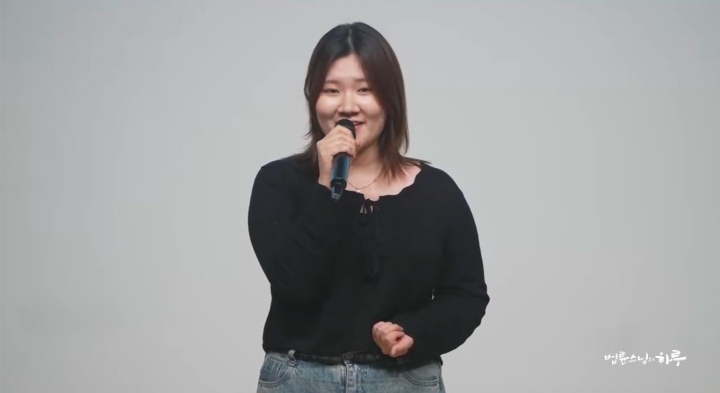
First, Sunim expressed his gratitude to the volunteers who had worked hard as the 100-Day Dharma Talk approached its conclusion.
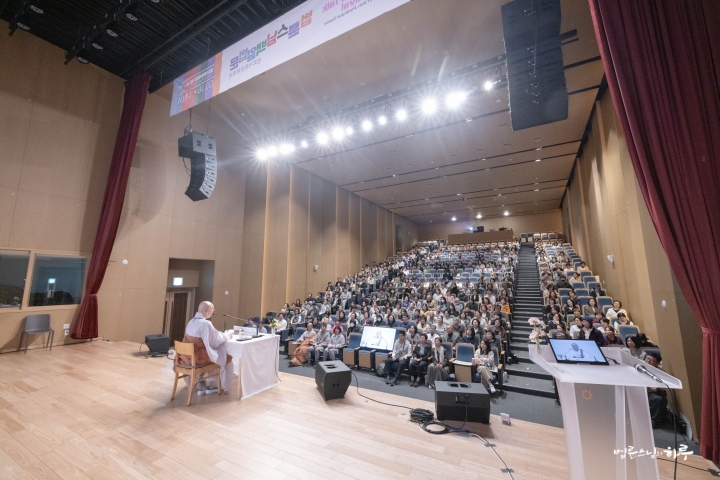
“Next week, all schedules for the 100-Day Dharma Talk will come to an end. During next Friday’s Dharma Q&A, I will introduce the volunteers who have been preparing for these sessions. The reason we have been able to continue these Dharma assemblies is thanks to the many volunteers who have worked hard behind the scenes. There is not a single paid employee in Jungto Society. All events are carried out by volunteers. I would like to take this opportunity to express my gratitude to all the volunteers.”
For the next hour and a half, four people asked Sunim questions. One of them sought Sunim’s advice about custody issues, explaining that his wife was having an affair and being violent toward him while they were going through divorce proceedings.
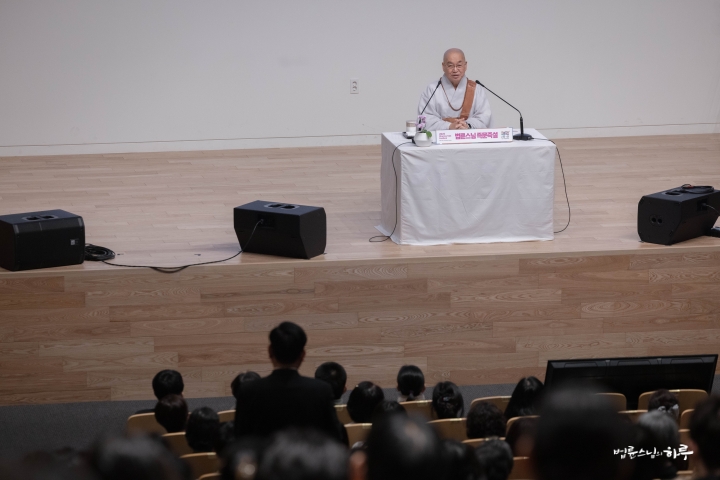
What Should I Do About My Wife Who Demands Custody Despite Her Infidelity and Violence?
“Have you been to the hospital?”
“I haven’t been yet.”
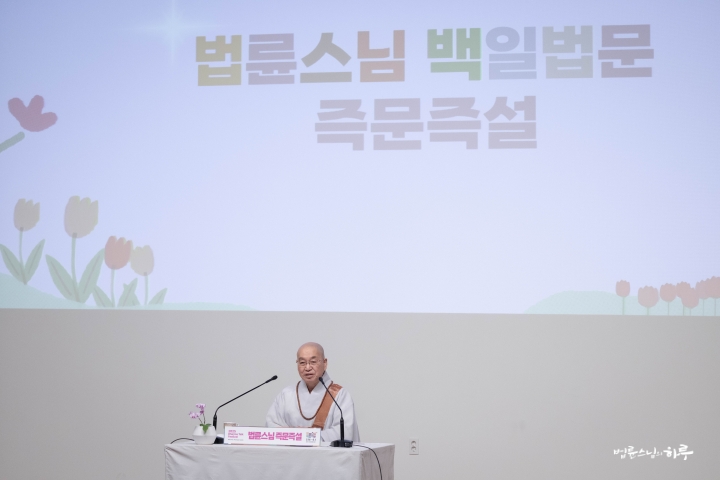
“First, you need to go to the hospital. Go to the hospital, tell the doctor about your current state, and if there’s nothing wrong, then move on to the next step. However, if you’re diagnosed with severe anxiety, you need to get treatment first. This isn’t the time to talk about your wife or children – you need to look at yourself first. Trying to help others when you can’t even take care of yourself properly isn’t dedication. You need to survive first. When do you expect the divorce proceedings to be finalized?”
“The final court date is scheduled for next week.”
“Then wait a few days, and in the final argument at court, say ‘Although we had conflicts, I would like to maintain our family if possible.’ Say this even if you don’t actually want to maintain the family. Who filed for divorce?”
“My wife did.”
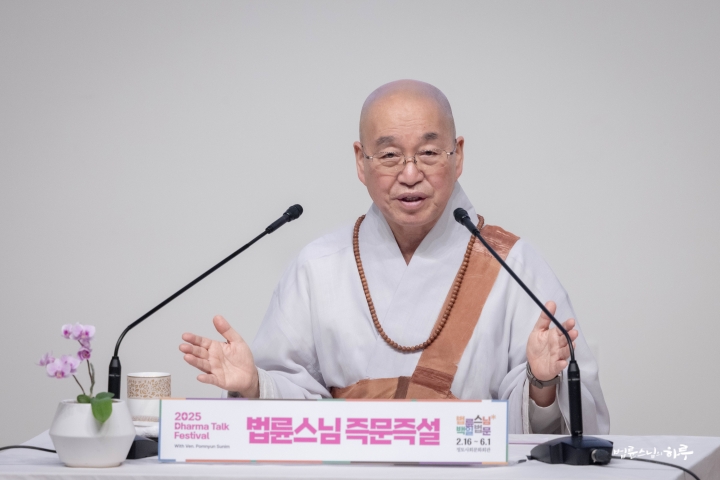
“Then even if you say you want to maintain the family, it won’t affect the withdrawal of the lawsuit. So continue to maintain the position that you want to preserve the family. Don’t argue with your wife in court, and since you have three children, suggest living together. Then your wife might come to her senses and agree to live together, or if she still wants a divorce, leave it to the judge’s decision. Don’t bring up the topic of the children first. If the judge tells you to raise them, then raise them. If your wife wants to raise them, let her. Even if she only wants to raise one child, do the same. Just do what your wife wants. Even if you end up raising the children, if your wife later asks to have your daughter, send her, and if she asks for your sons, send them too. There’s no need to fight over this. The judgment that ‘it’s better for me to raise the children’ is a wrong thought.
What’s worse for children than who raises them is parents fighting with each other. The fighting itself is most harmful to children. Marital disputes are the worst for children, and the next worst thing is the father raising the children. It’s best for children to be raised by their mother. Even if the mother has madness, it doesn’t matter to the children because she’s their mother. Unless the mother is completely out of her mind and physically abuses the children, they want to live with their mother. Even if they grow older and can’t bear it anymore and come to their father, in their hearts they still want to live with their mother. Even in nature, all offspring are raised by females. Fighting over children is not the duty of parents.
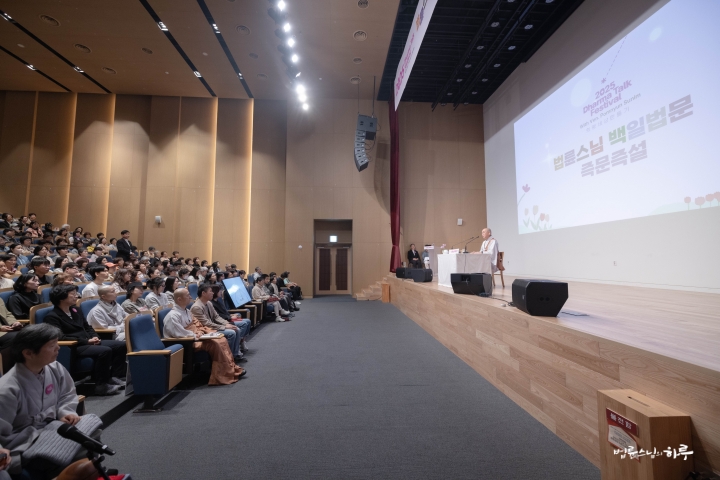
First, regarding the divorce, go along with what your wife wants, but say ‘I don’t want to divorce.’ This will give you a slightly better position in property division. Second, regarding custody, say ‘I love my children, so I’ll do as my wife wishes’ and ‘I’ll pay child support as my circumstances allow.’ If you’re asked to raise the children, say ‘I’ll do my best to raise them.’ The parents need to reach an agreement on custody issues. You shouldn’t let a judge decide on the children’s matters. The decision about whether a couple should live together should be made by the couple themselves, not by others. Why would you let someone else decide your own matters? Even if a judge formally makes the decision, if you establish your position, it essentially becomes your choice. If you adopt this perspective, it’s not a big deal.
The reason you stutter while saying ‘my wife has madness’ is because you yourself are anxious. If you weren’t anxious, even if your wife were a bit unusual, you would have calmly soothed her and encouraged her to see a doctor or suggested hospitalization. It wouldn’t be something to fight about. But the fact that you’re fighting together means you’re at the same level. That’s why I’m telling you to go to the hospital first. If you had a clear mind, there would be no reason to fight with your wife. Just looking at your wife’s symptoms, she needs medical treatment. Of course, if you suggest going to the hospital, she might cause a scene, but you still need to persuade her to get hospitalized or examined. If you fight together because the other person is acting crazy, then you also need to go to the hospital for treatment.
First, you need to save yourself. Check whether you are mentally healthy first. Right now, you’re being swept up by your wife’s condition and are mentally infected. You’re also being stubborn. So you need to look at yourself first. You must go to the hospital for an examination. If your condition is fine, that’s fortunate; if not, you need treatment. In court, you should say ‘I want to maintain the family.’ If the family is maintained, that’s good, and even if divorce is decided, you should have the perspective of ‘It’s fortunate I don’t have to live with such a wife.’ Regarding custody, do as your wife wants. Even if your wife changes her decision dozens of times, just let it be. Since you originally planned to raise all three children, any situation is within your range of choices. Even if you send some children to your wife, that’s already within your plan. Even if your wife is fickle, you shouldn’t be. Even if one parent is unstable, if the other parent maintains their center, the child won’t easily break down in the chaos. But if both parents fight and waver, the children will completely collapse mentally. You need to give your children the image that dad is always there in his place.”
“It’s resolved. I have no problems. Sunim, you are always my teacher. May the good energy of the universe always be with you.”
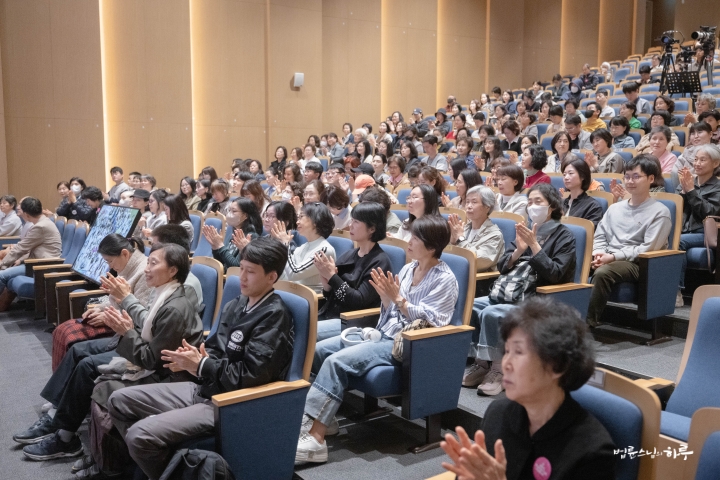
Questions continued to follow.
I have two sons over 20 years old. I’m wondering if it’s right to make them leave home. Also, although I’m older, would it be okay to start politics now?
I’ve been harmed by overtreatment. What should I do to reduce unnecessary treatment by medical institutions?
When I see shameless people living well, I feel envious. How should I live from now on, and how should I teach my child?
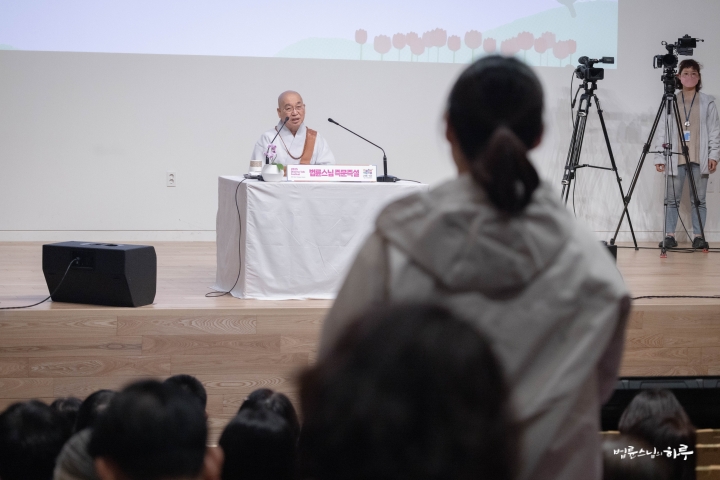
After receiving questions from four people today, it was time to finish. Although it was regrettable, the lecture ended at 12 o’clock.

After coming down from the stage, Sunim moved to the underground dining hall and had lunch with a guest who had been active in civic organizations for a long time. After finishing the meal, he moved to the Peace Foundation reception room and had a two-hour tea conversation with the guest.

From 3 PM, he attended the JTS interim board meeting. When all board members joined the online video conference room, he declared the meeting open and began the board meeting.
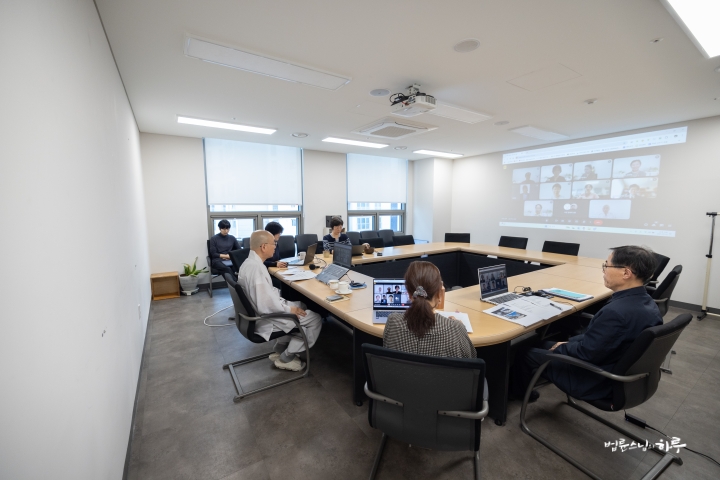
First, Sunim, as the chairman, gave opening remarks.
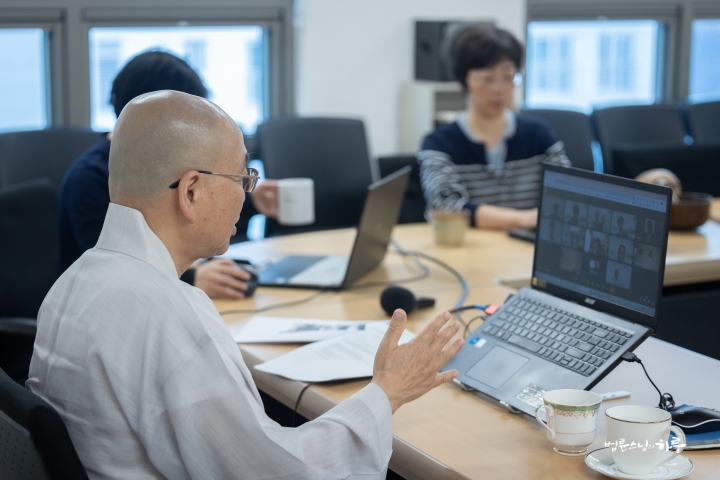
“JTS President Park Gina visited Syria for the past two weeks and returned to Korea yesterday. I received a report on the results of this visit, and since it exceeds the support budget confirmed at the board meeting at the beginning of the year, I thought it would be appropriate to hear the board members’ opinions and make a final decision. Therefore, I urgently convened this board meeting.
Syria, Where the Entire Country Is in Ruins – Hospitals and Schools Are Most Urgent
Syria has experienced civil war for 13 years, and the entire country has been reduced to ruins. However, the democratic rebels who controlled the area where JTS built a school last year overthrew the Assad dictatorship and came to power. Originally, JTS had plans to build new schools or repair destroyed ones. And since children couldn’t study while living as refugees for the past 13 years, we also planned to work on eradicating illiteracy. But now that the rebels in that region have become the Syrian government and control the entire country, we had to reconsider what is most needed for all of Syria. So the first thing they requested was to build hospitals. Most buildings have been destroyed, and among them, they want to restore the destroyed national hospital first. Although it’s repairing a collapsed hospital, the scale is so large that it seems to require significant financial support. And we need to provide all medical equipment. We also need to support various internal facilities including beds. So it seems that facility support costs will be higher than building construction costs. Furthermore, it seems that a lot of money will be needed for the originally planned work of building new schools or repairing collapsed ones. If we provide the requested support, it would be the largest support project in JTS history, so I’d like to hear the board members’ opinions.”
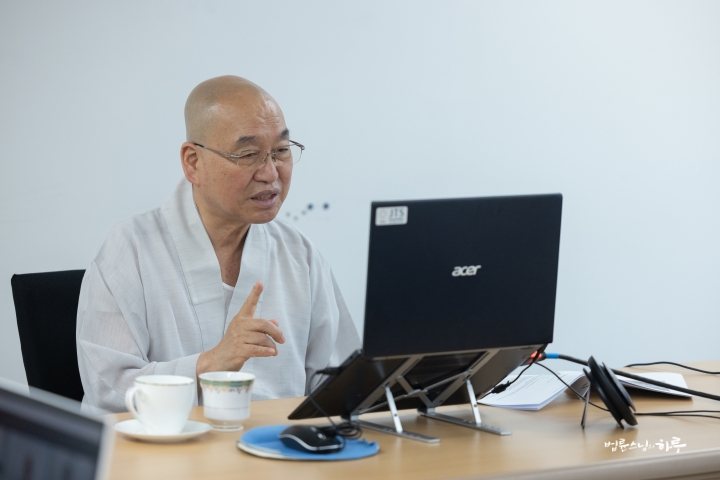
Next, JTS President Park Gina showed photos from her field visit and explained in detail the condition of the destroyed hospital.

“When I visited the site, refugees told me they want to return to their hometown, but they’re hesitant because there are no hospitals or schools. While the lack of schools is a major problem, they said the absence of hospitals makes them particularly reluctant to return home.”
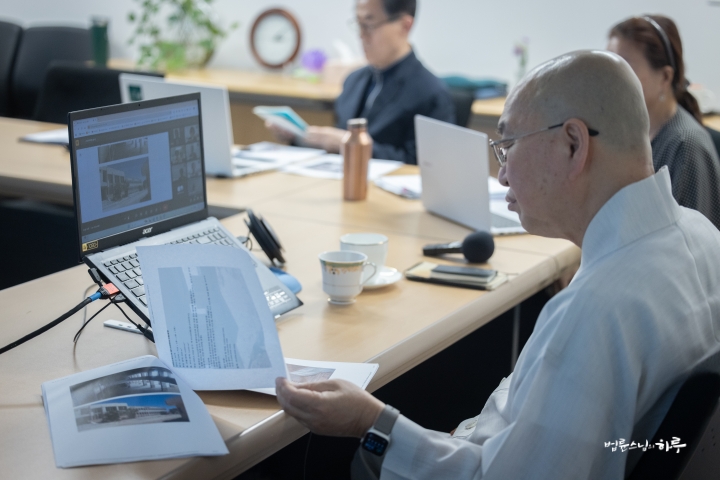
After hearing the explanation, JTS Co-President Kim Ki-jin also shared his thoughts.
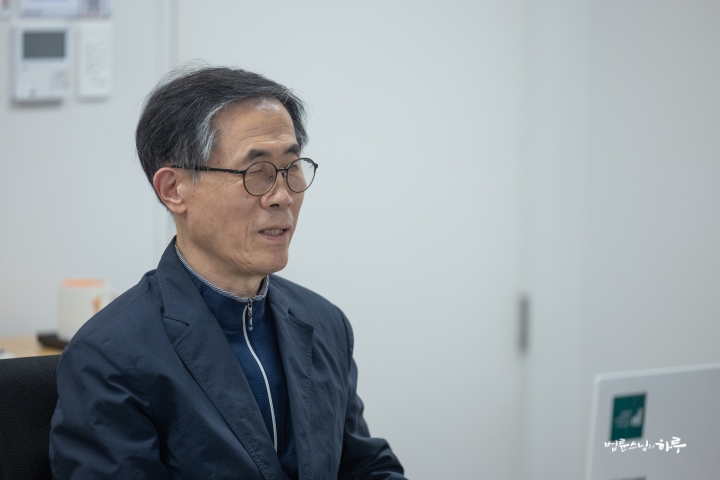
“JTS has been supporting impoverished regions. However, this Syria support project seems quite different from our previous efforts. Syria was a prosperous country that suddenly lost access to hospitals due to civil war. Since existing facilities are now unavailable, the situation seems more urgent. Therefore, if JTS has the financial capacity, I think it would be good to provide support.”
Sunim then continued facilitating the meeting. After everyone shared their opinions, they voted on the proposal.
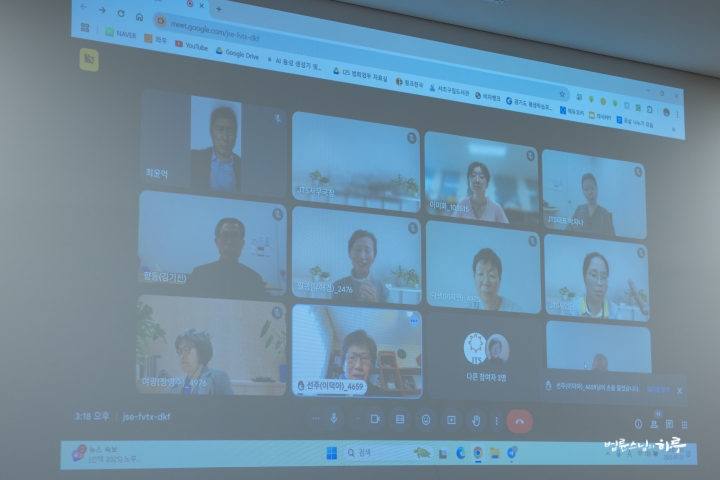
“Please raise your hand if you agree to proceed with the Syria support project despite the significant budget requirements.”
All board members voted in favor, and the decision was made to proceed with the Syria support project. The special board meeting then concluded.
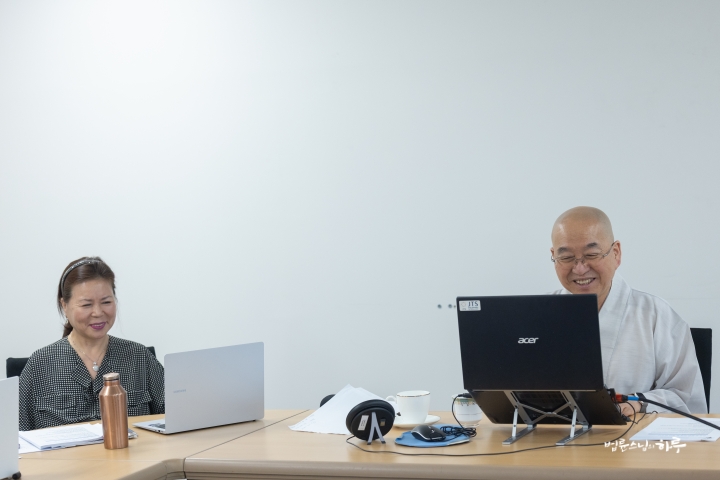
After sunset, at 7:30 PM, the Friday Dharma Q&A for office workers began. Many citizens came to the Jungto Social and Cultural Center after work to attend the Dharma Q&A. About 5,200 people connected via YouTube, and 160 people were present at the venue.
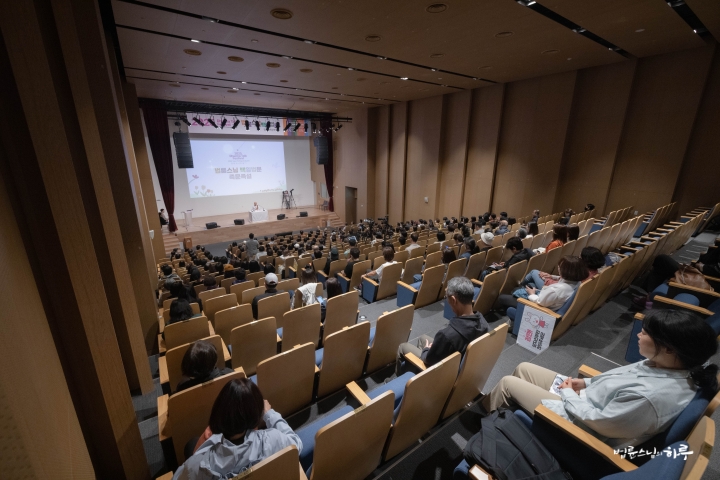
Before the lecture, Kim Dong-ha, a young Jungto Society volunteer, sang “That Day Long Ago” and “Raguyo” with a warm voice, receiving enthusiastic applause from the audience.
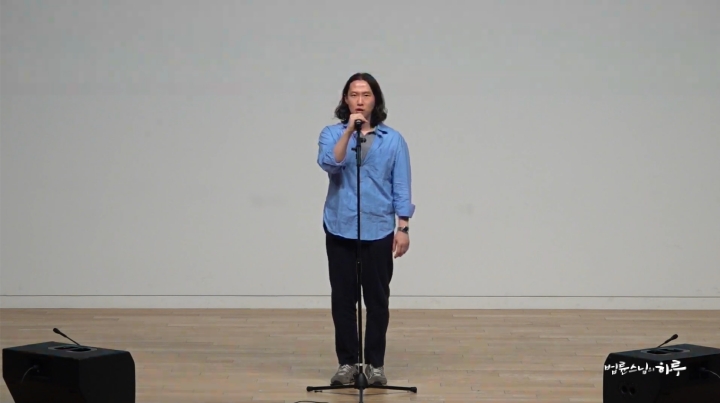
After reciting the Three Refuges and Words for Practice, Sunim took the stage. For an hour and a half, seven people raised their hands and had conversations with Sunim.
The first questioner expressed gratitude to Sunim.
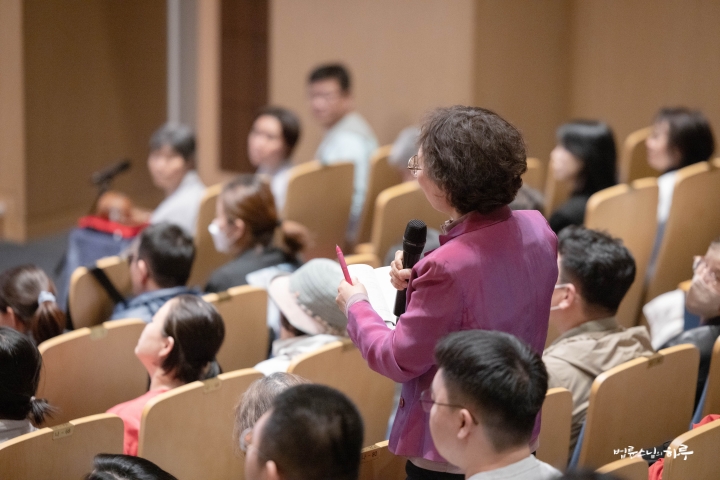
“Eight years ago, listening to Venerable Pomnyun Sunim’s Dharma Q&A helped me overcome the grief of losing my husband. Twenty years ago, my husband suddenly passed away in a car accident. I was thirty-seven years old then, and our daughter was twelve. Because my husband and I were so close, the pain was overwhelming. At that time, it felt like the sky was falling. Since my daughter was young, I couldn’t cry in front of her, so I cried inside while smiling in front of her. They say time heals all wounds, but that wasn’t true for me. However, as I listened to Venerable Pomnyun Sunim’s Dharma Q&A, I gradually began to escape from my suffering. Now I can smile from the bottom of my heart. So I joyfully share Sunim’s teachings with others, and people send me lots of hearts. These days, I live excitedly with that joy. I’ve wanted to see Sunim give a Dharma Q&A in person for a long time, and today I finally achieved that dream. I hope many people suffering can find true happiness by escaping from their pain like I did. Thank you.”
Everyone responded with loud applause to her bright and cheerful words.
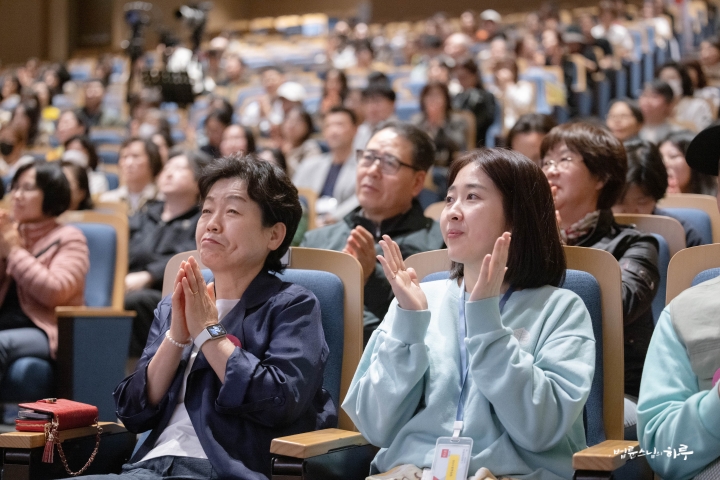
The next questioner asked for Sunim’s advice on how to maintain peace of mind when his wife produces excessive waste and doesn’t properly sort recyclables, which makes him angry.
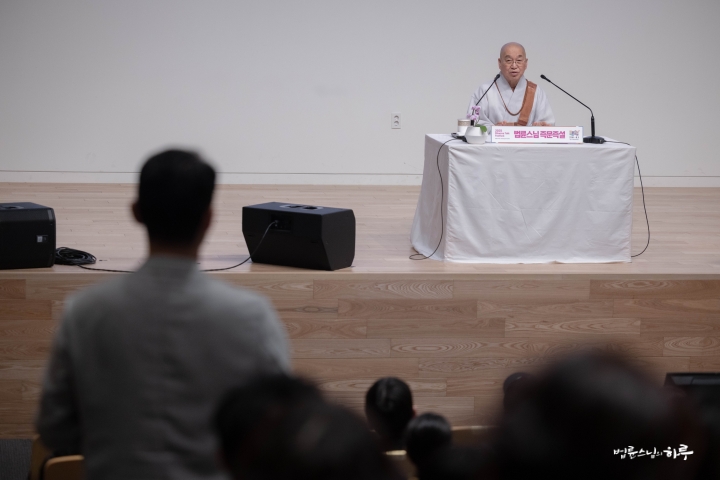
My Wife Creates Trash, I Clean It Up. How Can I Deal with My Discomfort?
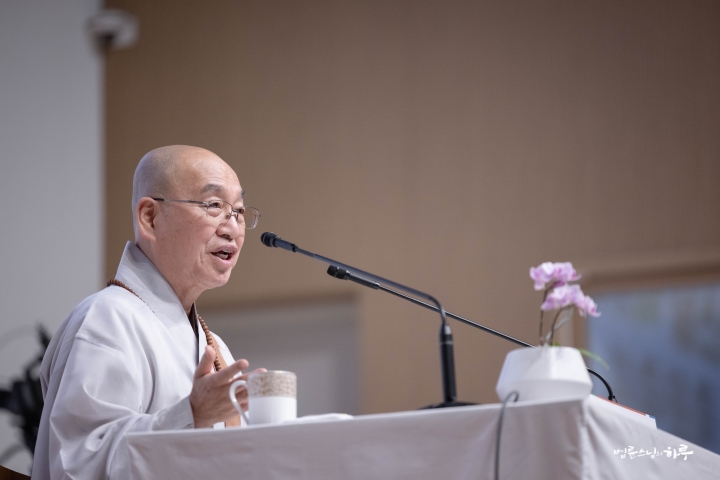
“Just think, ‘There are people who create trash and people who clean it up.’ It’s the same outside. When someone throws something away, someone else cleans it up. Here at the Jungto Social and Cultural Center too, when people put out trash, the waste management company collects it. That’s the janitor’s job. But if they got irritated every time they did this work, how could they live? They just accept it as their job and do it without much thought. Since you’ve taken on this task, you should think, ‘I am our household’s janitor.’ Take the perspective that ‘My job is to properly organize and take out the trash.’
Janitors don’t complain because they get paid. You probably wouldn’t feel particularly uncomfortable either if you were getting paid. If you received money each time you took out the trash, you might even do it happily. So this discomfort isn’t really about your wife or daughter being the problem, but rather because you’ve taken on this responsibility without compensation. If you adopt the perspective that ‘My role in the family is trash management,’ there’s no problem.
Also, only occasionally talk to your family about the importance of environmental issues. If you do it too often, it might sound like nagging. For example, you could share stories about the garbage patch in the North Pacific that’s seven times the size of the Korean Peninsula, or casually share short videos about environmental issues or related Dharma Q&A clips. But they need to be interesting. If they’re not entertaining, people won’t watch. It’s better to approach your family indirectly. While people might accept advice from others, when family members say it, they might react with ‘Who are you to teach me?’ and resist. It can create a sense of obligation and lead to rejection. While we have the freedom to choose whether to accept advice from others, words from family can feel like coercion.
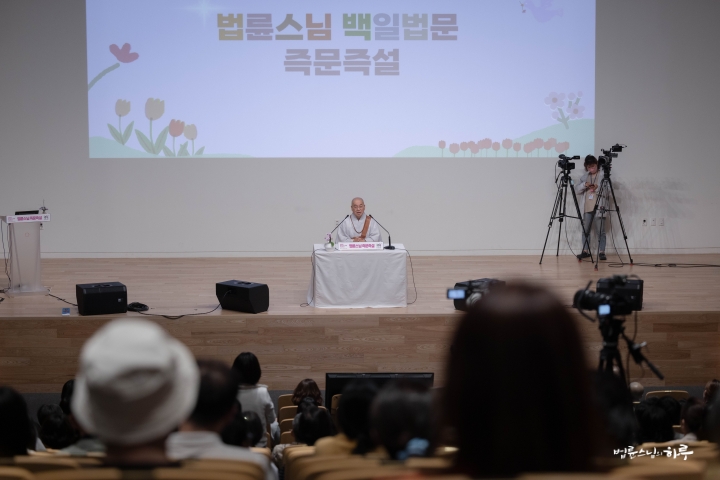
First, think of cleaning up trash as your responsibility and don’t worry too much about what your family does. Second, maintain steady interest in helping your family members change gradually. For example, after participating in Jungto Society’s ‘Awakening Retreat’ program, participants can develop awareness about living a life that produces no waste. Forcing doesn’t work. They might do it when you’re watching, but not when you’re not around. That’s why a steady, gradual approach is better.”
“Actually, I rarely say anything because I’m afraid it might sound like nagging. But if things don’t improve even when I follow your advice, I think I’ll feel uncomfortable again. What should I do then?”
“Then talk to your wife and charge $40 each time you clean up.”
“I don’t think she’ll pay.”
“Then I’ll pay you.” (Laughter)
“I understand. Thank you.”
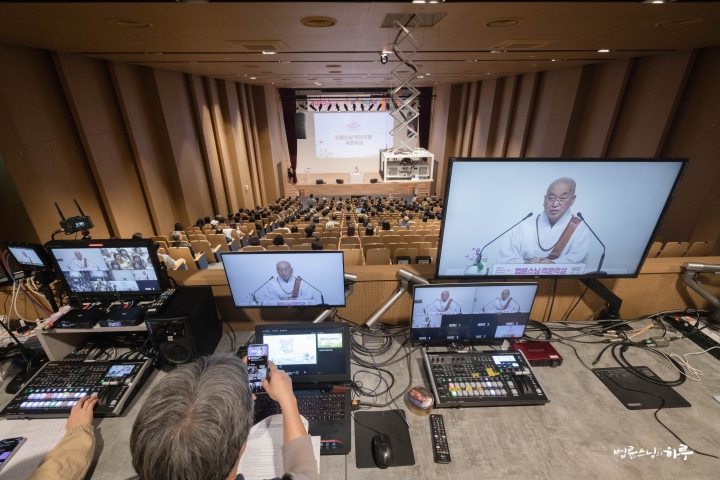
“In this era of climate crisis, producing excessive waste should be considered a crime. However, since laws, ethics, and morals haven’t fully reflected this perspective yet, there’s no way to enforce it. In the future, there will be a trend where excessive waste production and overconsumption will be legally restricted or viewed as ethically and morally reprehensible behavior. In children’s education, we need to teach that such behavior is a more serious crime than assault or theft. Stealing only changes ownership – it doesn’t create carbon dioxide, right? Even if someone hits or curses at another person, there’s no direct harm to the global environment. But excessive consumption and waste production create large amounts of carbon dioxide, ultimately threatening Earth’s ecosystem. Between humans, hitting and stealing are major crimes, but in the relationship between humans and nature, producing large amounts of carbon dioxide is an even greater crime.
Currently, environmental education, training, ethics, and laws don’t properly reflect this perspective. Our previous generation also lived consumptively, but at that time it didn’t exceed Earth’s self-purification capacity, so there was no such awareness. However, we’re now exceeding that limit, and this overconsumption will inevitably come back to us all as a great disaster. When that time comes, related laws and systems will be established, and children’s education will need to teach that it’s ‘a crime causing great harm to humans and nature.’ Then the problem will gradually be resolved.
But right now, there are no means to enforce this socially. While Korea considers high-stakes gambling a crime, casinos are legal in Las Vegas and Atlantic City in the United States. It’s the same with consumption. Currently, overconsumption is legal worldwide, and there’s even a situation where luxury is seen as something to boast about. However, someday social perception of overconsumption will change, and the day will soon come when it’s clearly regarded as a major crime. For now, there’s no clear solution other than making suggestions. But if you get angry or irritated about this issue, you’ll only suffer and your temperament will only get worse.”
“I’ll practice what you’ve said today, and if I have more questions, I’ll ask again. Thank you.”
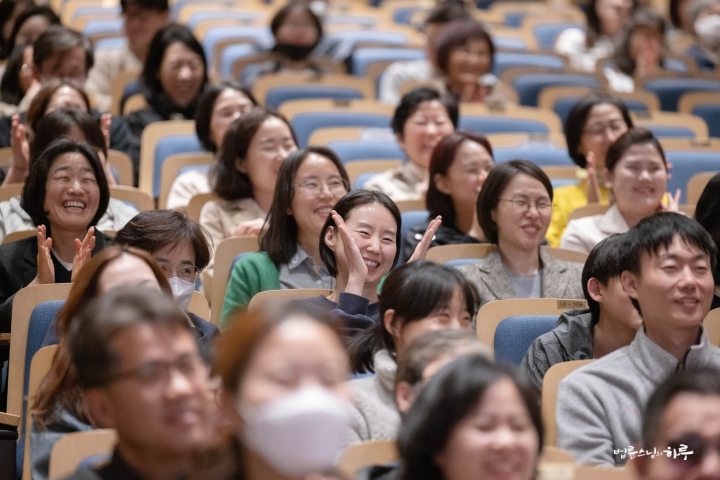
Questions continued one after another.
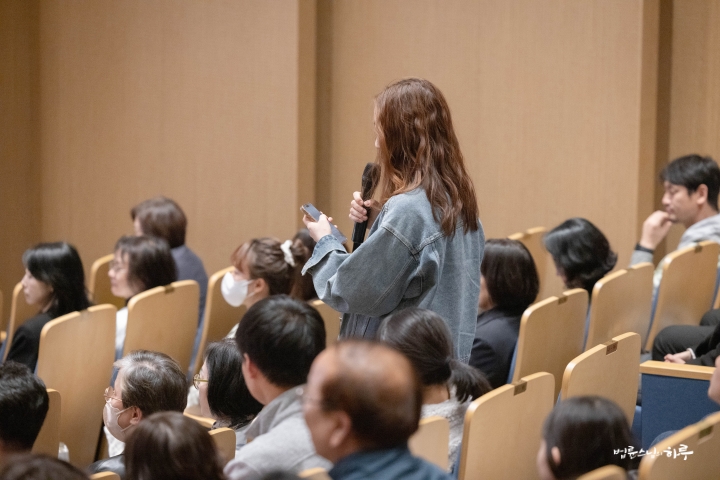
My parents have believed in superstitions since I was young. I feel very anxious when I do something they might dislike. How much should I believe and listen to what my parents say?
I’ve been working at the same company for 8 years, and they call me every time they need to lift something heavy. Once I refused and got into an argument with a female colleague. What should I do?
My parents say I sound very angry based on my tone of voice. I always speak the same way, so how should I change it?
I think too much and my thoughts keep going in circles. A friend says I’m clingy with people I’m close to or like. How can I become more independent?
Perhaps because I’ve heard more criticism than praise, positive words make me cringe. I’m sensitive to others’ criticism. How can I stop blaming myself?
There’s a diagnosis that the Korean economy is at a crossroads heading downhill. Is there a way to achieve economic growth while causing less environmental destruction?
After finishing the dialogue, it was 9 PM. Sunim concluded the lecture with the Four Great Vows, promising to meet again at the same time next week.
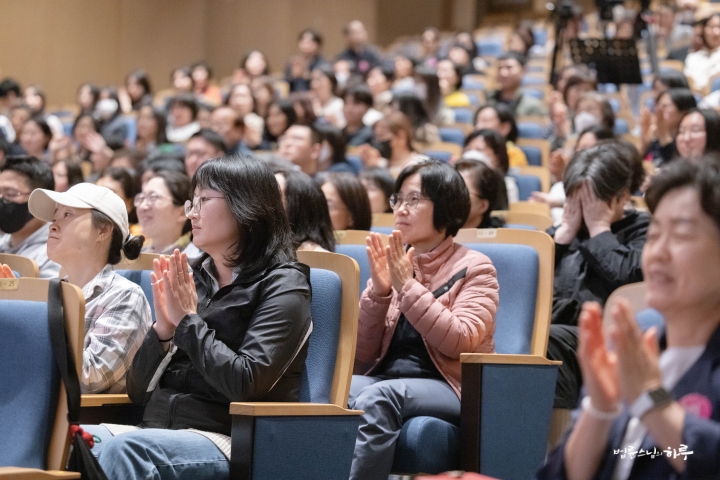
After leaving the lecture hall, Sunim immediately departed Seoul and headed for Dubuk Jungto Retreat Center.

After driving on the highway for 3 hours and 30 minutes, Sunim arrived at Dubuk Jungto Retreat Center at 12:30 AM and concluded the day’s activities.
Tomorrow, Sunim will spend the entire day doing farm work at Dubuk Jungto Retreat Center.





